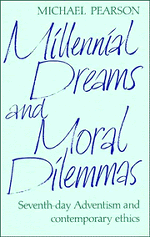Book contents
- Frontmatter
- Contents
- Acknowledgements
- I INTRODUCTION
- II MAJOR INFLUENCES IN ADVENTIST MORAL THOUGHT
- III ISSUES OF HUMAN SEXUALITY
- 5 Marital relations among Adventists: the pursuit of purity
- 6 Adventists and intimacy: the celebration of sex
- 7 Adventists and abortion: early hostility
- 8 Abortion: tensions in the institutionalized church
- 9 Early adventist women: in the shadow of the prophetess
- 10 Adventist women in the modern church: the pain of liberation
- 11 Divorce in Adventism: a perennial problem
- 12 Divorcing and enforcing: problems with principles and procedures
- 13 Homosexuality: the sin unnamed among Adventists
- 14 Homosexuality in Adventism: sin, disease or preference?
- IV POSTSCRIPT
- Notes
- Select bibliography
14 - Homosexuality in Adventism: sin, disease or preference?
Published online by Cambridge University Press: 29 September 2009
- Frontmatter
- Contents
- Acknowledgements
- I INTRODUCTION
- II MAJOR INFLUENCES IN ADVENTIST MORAL THOUGHT
- III ISSUES OF HUMAN SEXUALITY
- 5 Marital relations among Adventists: the pursuit of purity
- 6 Adventists and intimacy: the celebration of sex
- 7 Adventists and abortion: early hostility
- 8 Abortion: tensions in the institutionalized church
- 9 Early adventist women: in the shadow of the prophetess
- 10 Adventist women in the modern church: the pain of liberation
- 11 Divorce in Adventism: a perennial problem
- 12 Divorcing and enforcing: problems with principles and procedures
- 13 Homosexuality: the sin unnamed among Adventists
- 14 Homosexuality in Adventism: sin, disease or preference?
- IV POSTSCRIPT
- Notes
- Select bibliography
Summary
Homosexuality in the United States
In the inter-war years, some small groups of homosexuals were organized, for example, the Chicago Society for Human Rights in 1934–5, but these were ephemeral. Most homosexuals chose to conceal their sexual orientation on account of the incomprehension and hostility of the general public. Literary efforts to deal with the subject were soon suppressed. While members of the public continued to regard homosexuality variously as a sin, a crime, or, at least, a repulsive moral aberration, for some doctors it had graduated to the status of illness, for which a number of radical cures were tried. A minority which opposed the view of homosexuality as a disease, took its lead from the German, Dr Magnus Hirschfeld, who regarded it as an unchangeable inborn sexual variation, neither to be treated nor punished. However, the general recodification of law which many states undertook around 1950 reflected a public opinion which was still firmly opposed to homosexuality; heavy fines and prison sentences were imposed on offenders.
A principal agency in the modification of attitudes towards homosexuality was the massive research carried out by Alfred Kinsey and his associates at the Institute for Sex Research at the University of Indiana. His research, published as Sexual Behavior in the Human Male (1948), and Sexual Behavior in the Human Female (1953), was the most comprehensive of its type ever carried out.
- Type
- Chapter
- Information
- Millennial Dreams and Moral DilemmasSeventh-Day Adventism and Contemporary Ethics, pp. 235 - 272Publisher: Cambridge University PressPrint publication year: 1990



